Is there any other fruit that can compare to the summery goodness of watermelon?
I mean, no summer BBQ is complete without the ceremonial watermelon cutting and inevitable sticky fingers and chins.
So while you’re enjoying this carefree treat, I just thought you should know that you’re also eating something totally healthy and nutritious.
Watermelon is actually 92% water – talk about staying hydrated! I bet this is a huge reason why watermelon is so ubiquitous during the summer when sweating in the heat causes us to become dehydrated.
You see, watermelon is related to other water-bearing fruits and veggies like cantaloupe and cucumber, but it’s also related to healthy squashes like zucchini and pumpkin. So it has the ‘best of both worlds’ kind of thing going on.
If you thought watermelon was just a tasty water replacer, think again. There’s a lot more to this melon than meets the eye.
- What’s Actually Inside Watermelon?
- The Health Benefits of Watermelon
Table of Contents
+What’s Actually Inside Watermelon?
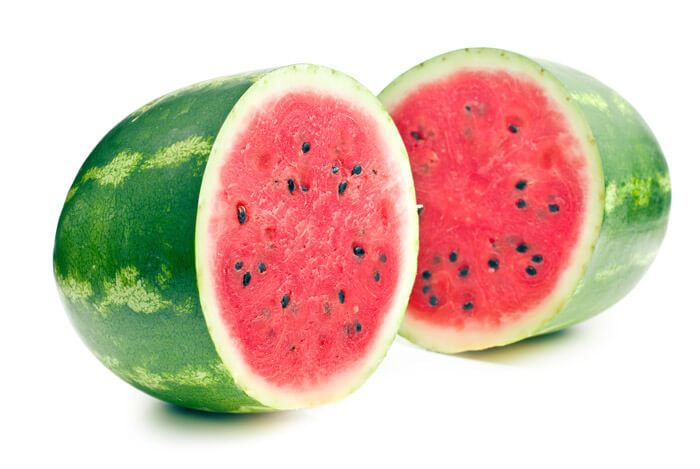
This brightly colored fruit contains a slew of vitamins, minerals, amino acids, antioxidants, and phytonutrients.
Just one cup of watermelon provides:
- 17% of vitamin A – 865 IU
- 21% of vitamin C – 12.3 mg
- 5% potassium – 170 mg
- Thiamin – 0.050 mg
- Riboflavin – 0.032 mg
- Niacin – 0.271 mg
- Vitamin B6 – 0.068 mg
- Folate – 5 ug
- Magnesium – 15 mg
- Phosphorus – 17 mg
- Zinc – 2 mg
- Copper – trace amounts
- Manganese – trace amounts
- Selenium – trace amounts
- Choline – trace amounts
- Lycopene – 6979 mcg
Hello nutrients! It’s hard to believe you get all of that for a mere 46 calories!
Watermelon isn’t as high in antioxidants as other fruits like blueberries, but it does have citrulline – an amino acid, and lycopene – the antioxidant that makes tomatoes so healthy for us.
Watermelon is King of Citrulline
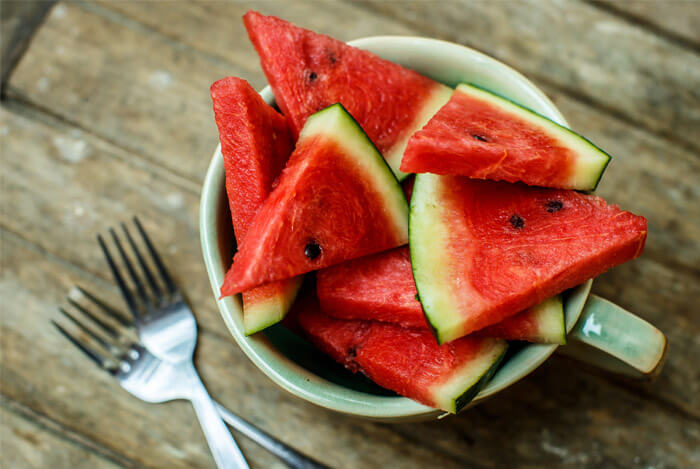
Watermelon is a great source of citrulline in our diets.
While you’ll find citrulline in the juicy red flesh part of the watermelon, the highest concentrations actually live in the white rind.
Which, newsflash: you can eat.
I never knew that every part of the watermelon is completely edible, not just the juicy red flesh. You can cut away the red pulp and throw the rind into a blender for a delightful smoothie addition.
Anyway, when our bodies digest citrulline, it gets converted into arginine, another essential amino acid. Watermelon has been shown to increase both citrulline and arginine levels in our blood so we have more to use.
Even though there’s a ton of citrulline in watermelon, we can’t rely on it as our only source of arginine. In fact, you’d have to eat 5 pounds of watermelon to get your RDI of arginine.
I love watermelon, but I don’t love that much watermelon at any one time!
Watermelon Has More Lycopene Than Tomatoes
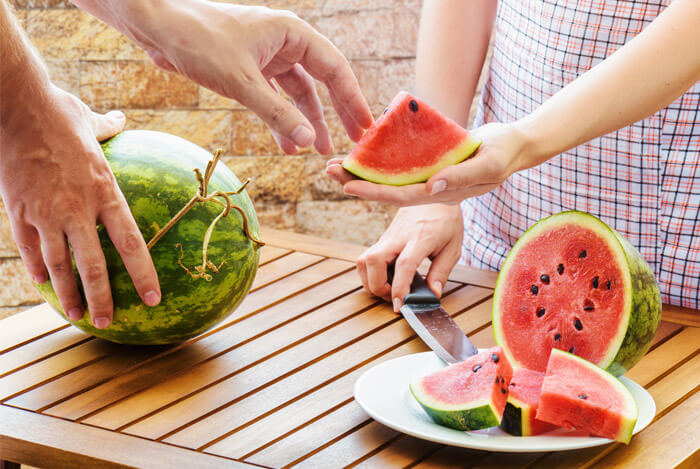
One cup of fresh watermelon has 1.5 times the amount of lycopene found in a large fresh tomato.
Lycopene is a phytonutrient, which means it’s a nutrient that’s naturally occurring in plants and is also beneficial to our health when eaten.
Lycopene is responsible for giving that characteristic red color to watermelon, tomato, guava, and red grapefruit. The more your watermelon ripens, the darker it will be, and the higher your lycopene concentration becomes.
So what else does watermelon specifically do for our bodies?
The Health Benefits of Watermelon
I bet you thought watermelon was all sugar and water, but I’m going to shed some light on the secret powers of this incredible fruit.
Here’s some of the best health benefits watermelon provides for our bodies.
Lowers Blood Pressure & Improves Heart Health
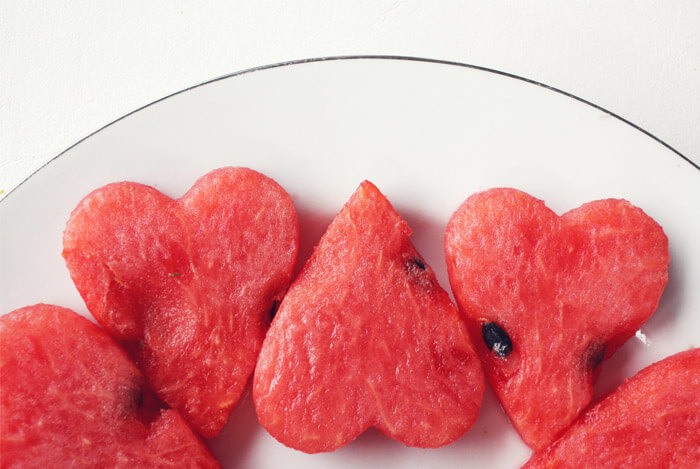
High blood pressure, or hypertension, puts millions of people at risk for heart disease, heart attack, stroke, and kidney disease.
Citrulline and arginine both help our bodies synthesize and produce nitric oxide (NO).
NO is a gas that causes the muscles around the body’s blood vessels to relax and dilate. It also helps the arteries become more flexible, which makes it easier for blood to flow, so our blood pressure decreases.
One joint study from Purdue University and the University of Kentucky aimed to test the theory that the citrulline in watermelon could have benefits for cardiovascular health.
They split up groups of mice and fed half the group water containing 2% watermelon juice, while the other half received the same amount of water “supplemented with a solution that matched the carbohydrate content of the watermelon juice”.
After all the mice ate a diet high in cholesterol and saturated fat, researchers noticed that the mice drinking the watermelon juice had about 50% less LDL cholesterol, or bad cholesterol, and also had close to a 50% reduction in the plaque in their arteries.
The mice on the watermelon beverage only gained 30% of the weight that the non-watermelon drinkers gained.
When researchers analyzed the levels of citrulline in both rat groups, they noticed elevated levels of the amino acid in the watermelon mice, which means their bodies were able to take full advantage of it.
Scientists believe that the citrulline in watermelon is able to lower cholesterol, decrease bad cholesterol, and even fight weight gain.
Another study published in the American Journal of Hypertension proved that watermelon extract reduced blood pressure and even hypertension in obese adults. Reducing high blood pressure decreases all those scary risks for heart disease, so this is great news indeed.
Combats Insulin Resistance
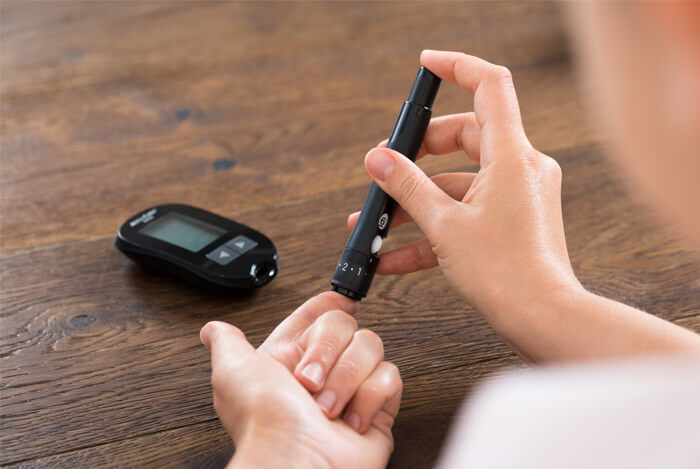
We know that our bodies need the hormone insulin to help regulate our blood sugar levels.
But when you become insulin resistant, like when you have type 2 diabetes, the body produces insulin, but the cells won’t do their job and become resistant to the way insulin is meant to work. Because of this, it becomes very hard to keep blood sugar levels stabilized and leads to high blood glucose levels.
However, some studies link the arginine in watermelon to decreased insulin resistance, meaning it’s easier for the body to use insulin with the help of arginine found in watermelon.
It may seem counter intuitive for diabetics to eat because it has simple sugars such as sucrose, fructose, and glucose, and has a very high GI Index coming in around 72. So I’m not suggesting that you do in fact start chowing down on it too much. But according to the research, a little bit here and there might provide some benefits.
This research was done on diabetic rats, so it may not matter at all for you, but it’s possible there’s a small benefit.
If you’re following diabetic diet plans or a gestational diabetes diet, just make sure to count the carbs in your watermelon serving and you should be fine to enjoy it in moderation.
Fights Inflammation

Lycopene’s an antioxidant that’s been known for it’s anti-inflammatory properties and there’s a TON of it in watermelon.
Lycopene works to protect your body from cell damage.
Watermelon also contains cucurbitacin E, a compound that reduces the activity of pain and inflammation-causing enzymes. It works to block certain enzymes just like NSAIDs like aspirin and ibuprofen.
So watermelon not only fights off the bad guys, but it tries to ease your pain until your body heals everything up.
Hydrate with Natural Electrolytes
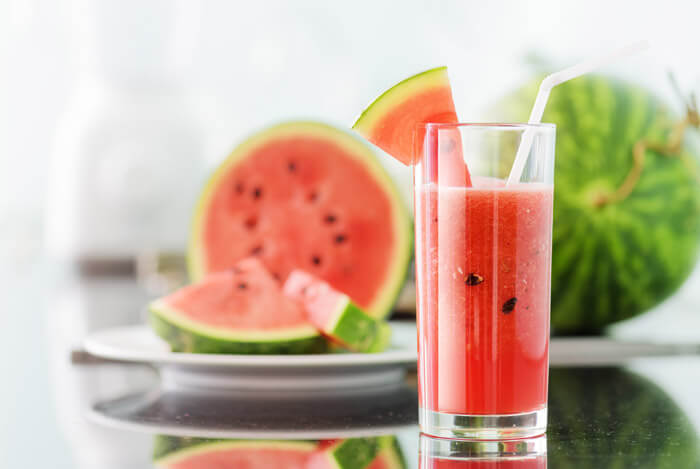
Sure, watermelon is made of 92% water, but it’s also full of important electrolytes to keep you hydrated. It’s also high in potassium, which helps manage hydration levels in the body and allows oxygen to make the rounds to all the cells. It’s also important for regulating heartbeat and muscle function.
With 5% potassium per serving, watermelon’s a quick way to load up on water and electrolytes.
I never gave much thought to the health benefits associated with watermelon.
Sure, I always praised it for its ability to hydrate and quench my desire for sweets, but I never knew it could lower blood pressure and even prevent kidney stones. Especially since it tastes better than junk food!
I’m glad I learned all of this so I’ll be feeling a little less guilty when I eat a ton of watermelon this summer – and I’ll definitely be juicing the healthy rinds from now on. Move over kale smoothies, it’s watermelon season!










